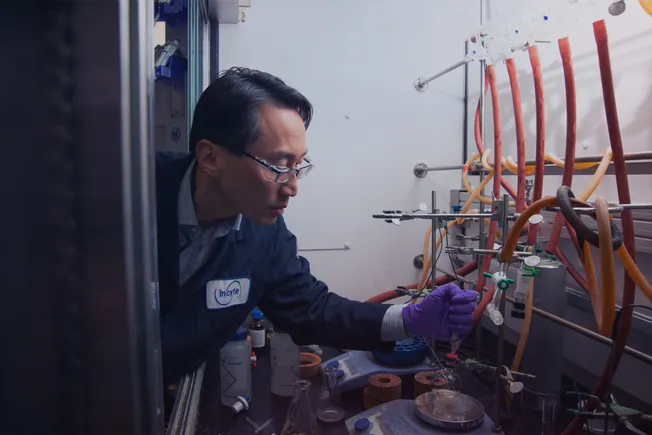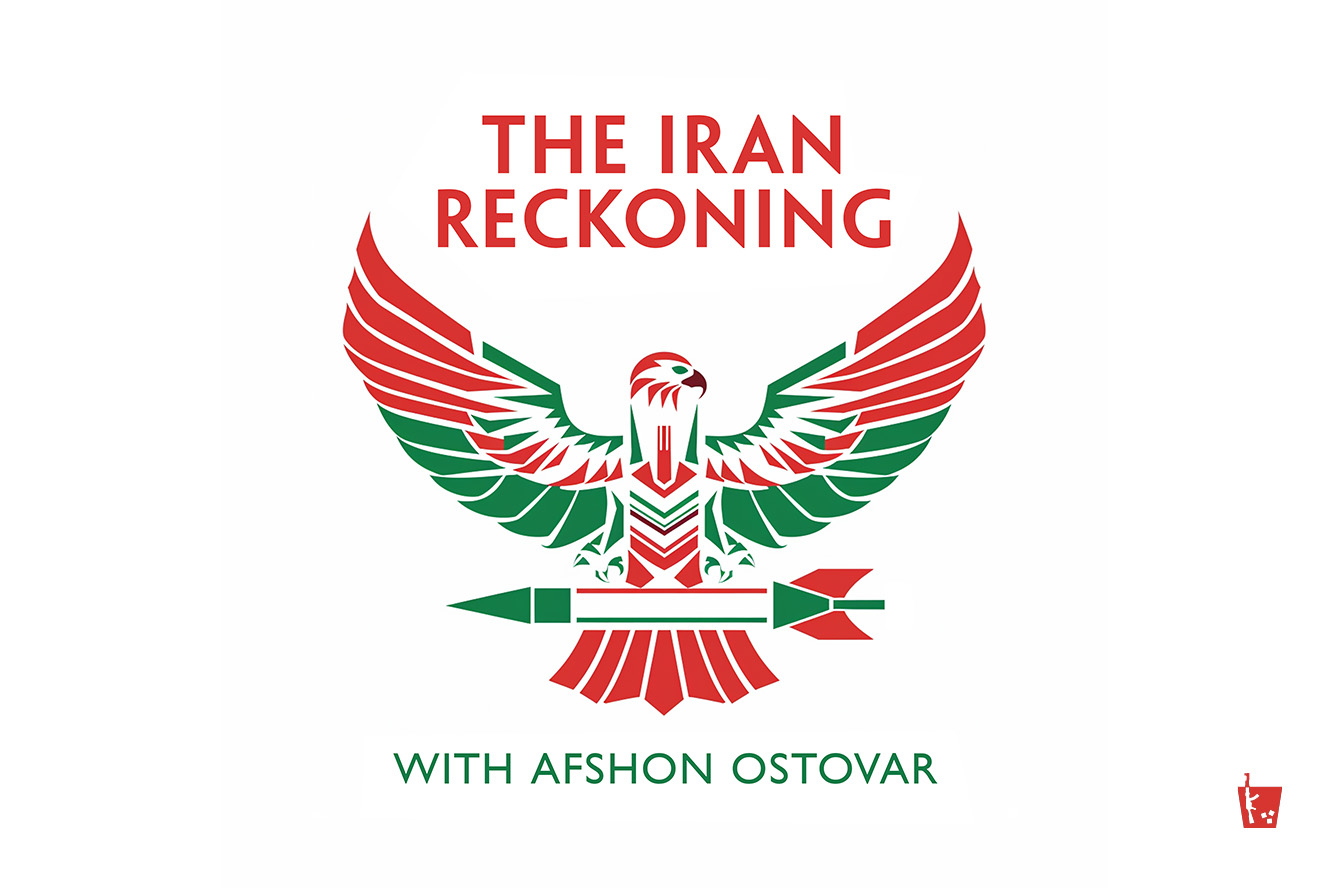Jackie Chan Returns To “Karate Kid” — And He’s Bringing Pandas, Wisdom, And Wild Stories With Him
From panda conservation to fight scenes and legacy talk, Jackie Chan opens up like never before in this exclusive interview on the Karate Kid. The post Jackie Chan Returns To “Karate Kid” — And He’s Bringing Pandas, Wisdom, And Wild Stories With Him appeared first on Haute Living.
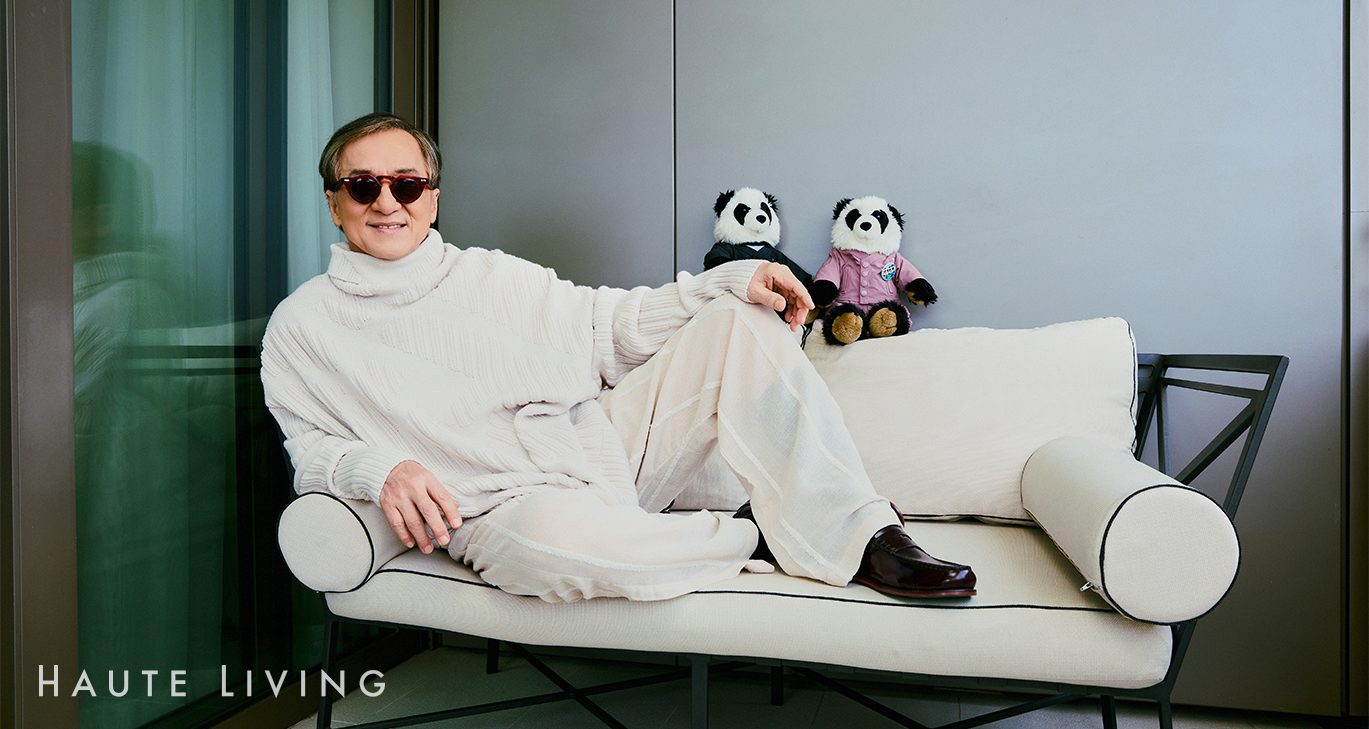
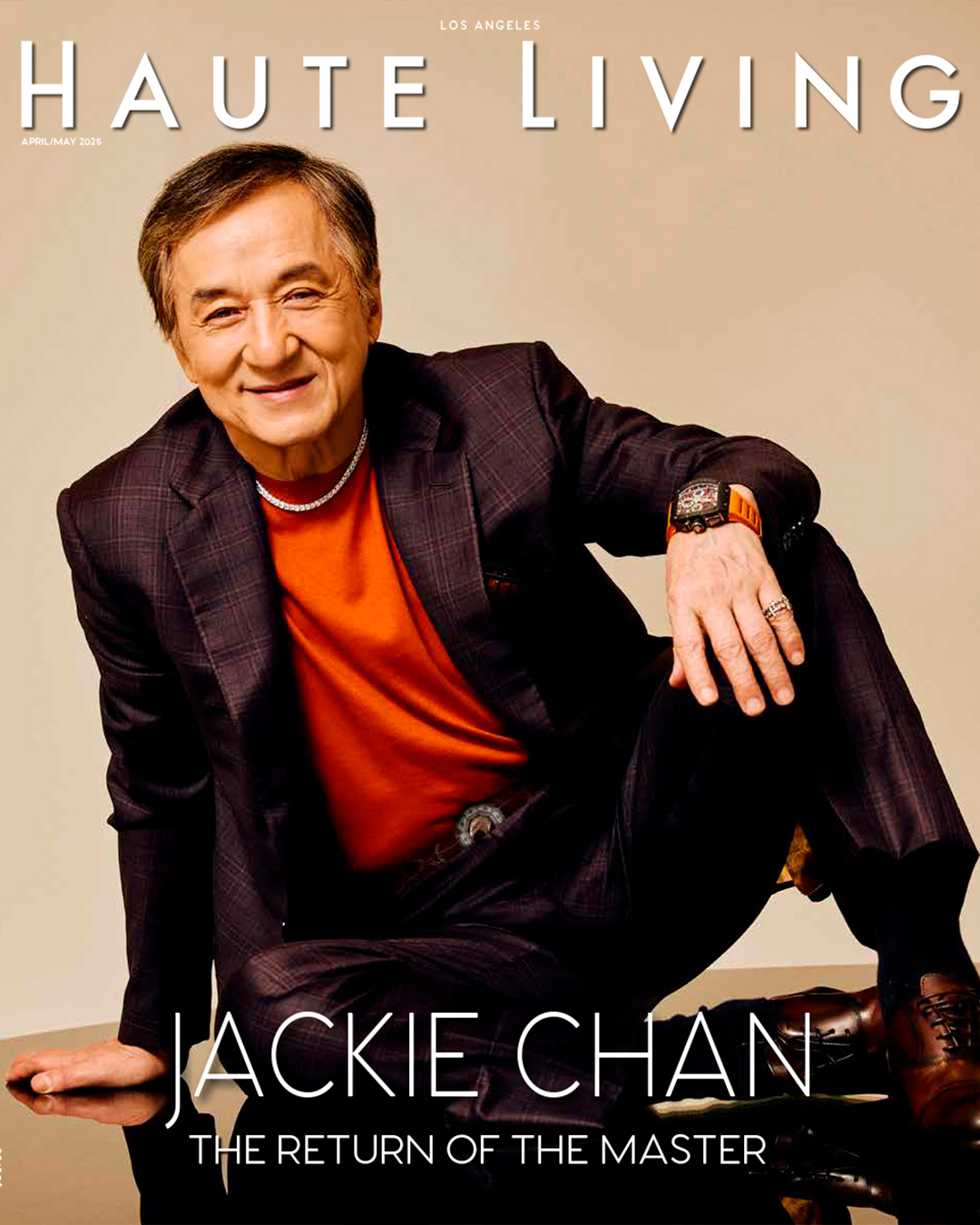
Photo Credit: Juan VelozJACKIE CHAN PROVES ONCE AGAIN WHY HE’S ONE OF THE BIGGEST STARS IN HOLLYWOOD AS HE LEAPS BACK INTO THE KARATE KID UNIVERSE AFTER A 15-YEAR HIATUS.
BY LAURA SCHREFFLER
PHOTOGRAPHY JUAN VELOZ
STYLING UGO MOZIE
GROOMING MELANIE HUGHES-WEAVER
SHOT ON LOCATION AT THE WALDORF ASTORIA BEVERLY HILLS

PANTS: Eleven Sixteen
SHOES: 313 Eko
SUNGLASSES: Oliver Peoples
RING: Emmanuele Bicocchi
Photo Credit: Juan Veloz
From the moment Jackie Chan walks into the Waldorf Astoria Beverly Hills for our cover shoot, he’s on. His energy feels boundless as he hams it up for the camera, theatrically popping out from behind a curtain, throwing himself in and over the side of a bathtub, and wildly tossing a plate of pasta in the air. His mouth hangs open in exaggerated shock, as if he’s about to attempt an impossible bite mid-flight. There’s no performance too small, after all.
But then, Jackie Chan doesn’t have an ‘off’ switch. Regardless of whether he’s in front of a lens or not, the Jackie you see is the Jackie you get — a winning combination of fun and funny, animated expressions, and impeccable timing, with a childlike glee that has defined his career for over six decades. Case in point: he travels with a backpack containing two stuffed pandas named Chan La and Chan Zy — LA-ZY for short. The toys have posed with the crème de la crème of A-listers (many of which he shows me while slowly scrolling through his phone) and were even his red-carpet accessories during the 2017 Academy Awards. “They see everything,” he says with a grin. “Lazy pandas. They travel the world without lifting a finger — always traveling but never working!”
The same can’t be said of Chan, who’s been acting steadily since the age of eight, when he was first seen in the 1962 Cantonese film Big and Little Wong Tin Bar. In the decades since, he has appeared in over 150 films spanning martial arts classics, comedies, and Hollywood blockbusters alike, inclusive of the Rush Hour trilogy, Kung Fu Panda, and — his highest grossing film of all time — 2010’s The Karate Kid. Now, nearly 15 years after his first turn as maintenance man-cum-kung fu master Mr. Han, Chan, now 71, is stepping back into the role for The Karate Kid: Legends, which will hit theaters this summer via Sony Pictures Releasing — and he’s beyond happy to do so.
“I was for sure super excited,” he says. “It’s been almost 15 years!”
Unlike its predecessor, which was set in China, The Karate Kid: Legends brings Mr. Han to New York City, where he crosses paths with Daniel LaRusso, played by Ralph Macchio. The sixth film in the franchise features a storyline placed after the sixth and final season of the series Cobra Kai (2018–2025), thus taking the Karate Kid mythology in a fresh direction with a new set of characters.
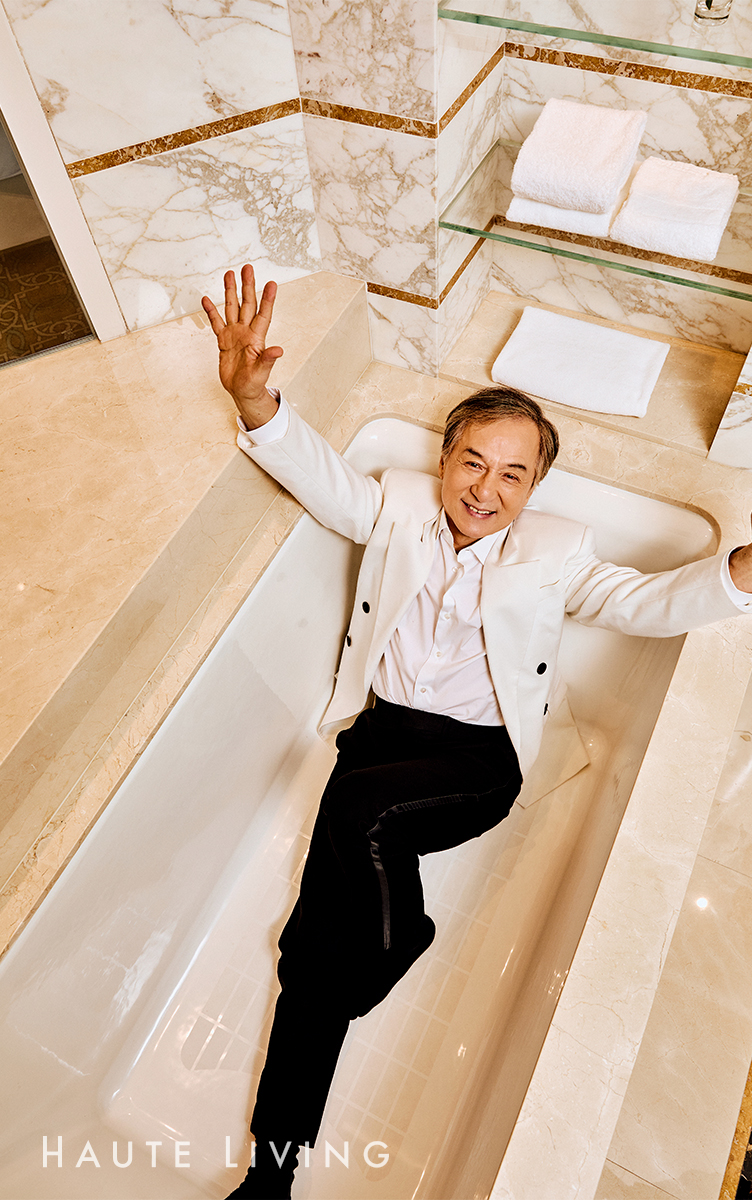
Photo Credit: Juan Veloz
“We both aged 15 years, that’s for sure!” Chan notes cheekily when asked what’s changed for his character in that lengthy gap, adding, “Well, this time, Mr. Han comes to New York and experiences the Big Apple. But he’s still the shifu who cares the most about his students.”
At the center of the story is a new protégé — Li Fong, played by Ben Wang — a kung fu prodigy from Beijing who moves to New York with his mother after a family tragedy. As Li struggles to adapt to his new life, he finds himself caught between the traditions of his past and the challenges of his present. Initially reluctant to fight, he is pulled into a karate competition to help a friend in need, forcing him to expand his skills beyond his kung fu training. To prepare him, Mr. Han enlists LaRusso, the protagonist of the very first Karate Kid film (which debuted in 1984), creating an unprecedented collaboration that blends both kung fu and karate — two distinct martial arts philosophies coming together as one.
“It’s the first time, and I’m glad we had this opportunity to work together and teach this lucky kid both karate and kung fu. It’s definitely different styles, but I think with the same goal. We work together easily, and since our families know each other from long before, it makes everything even easier,” he says.
Chan is particularly enthusiastic about Ben Wang stepping into the role, praising his young co-star’s dedication to the craft.
“Ben must have done something right to earn this,” Chan enthuses, making it clear that in his opinion, Wang was the right choice for the part. “To me, he’s a good boy, a really good boy. He learns stuff fast and is always so humble and dedicated to this role.”
The film culminates in an intense rooftop showdown — a visually stunning sequence that showcases Li’s evolution as a martial artist. It’s a moment that encapsulates the film’s message: that resilience and discipline transcend cultural and generational divides.
For fans of the franchise, The Karate Kid: Legends promises to deliver all the martial arts action they’ve come to expect. Yet, when pressed for details, Chan is characteristically playful… but also tight-lipped. Like a parent at Christmas who refuses to spoil the secret for his child, he reveals very little in terms of specific details, noting sassily, “[It’s] the kind you haven’t seen in 15 years! I can’t say too much!”

Photo Credit: Juan Veloz
Beyond the fights, Chan promises that the heart of the franchise is also completely intact. “There definitely is some really good action, but you also see friendship and dedication. And you’ll see [that] when people hold hands and work together, there’s a miracle.”
And so, for Chan, The Karate Kid: Legends is not just another film — it’s an opportunity to bring these values to a new generation, and to find a new way of pushing past limits. And no one knows more about pushing limits than Jackie Chan.
Throughout his career, he has rewritten the rules of action filmmaking. His commitment to performing his own stunts has resulted in some of the most jaw-dropping moments in cinematic history — often at the cost of broken bones, concussions, and near-death experiences. In Project A (1983), he plummeted from a 60-foot clock tower, free-falling through two awnings before crashing onto the ground. In Police Story (1985), he slid down a 70-foot pole covered in live electrical lights, shattering glass and suffering third-degree burns on his hands. In Who Am I? (1998), he rappelled down the side of the Willemswerf building in Rotterdam without a harness. These stunts aren’t just for spectacle; they define his entire philosophy of filmmaking — a commitment to authenticity, danger, and pushing his own physical constraints.
“Of course, I always do my own stunts. It’s who I am. That’s not changing until the day I retire, which is never!” he says, laughing. “And to be honest, when you’ve done it for 64 years straight, there’s no physical preparation anymore. Everything is in your heart and soul; it is muscle memory,” he declares. And while the action genre may have evolved with CGI and wirework, Chan remains a firm believer that real action comes from true risk. “In the old days, the only [choice we had] was to be there and jump; that’s it. Today, with computers, actors can do anything, but there’s always a sense of reality that you feel is missing,” he says. “It’s a double-edged sword. On one hand, actors become more and more capable of doing impossible stunts with the help of technology, and yet, on the other hand, the concept of danger and limit gets blurred and the audience is numb [to it]. But I’m not encouraging anybody to risk their lives to do the stunts like I did; it truly is too dangerous,” he hastens to add.
Still, at this stage in his career, Chan knows his role in action cinema is evolving. He’s no longer just the daredevil stuntman — he’s a mentor, both in front of and behind the camera. From training the next generation of stunt performers in his JC Stunt Team to working with young actors like Wang as well as Jaden Smith in The Karate Kid franchise, Chan — much like Mr. Han — has long embraced the role of a teacher. It’s a responsibility he takes seriously — both on-screen and off. And for him, that’s just as thrilling as any rooftop leap.
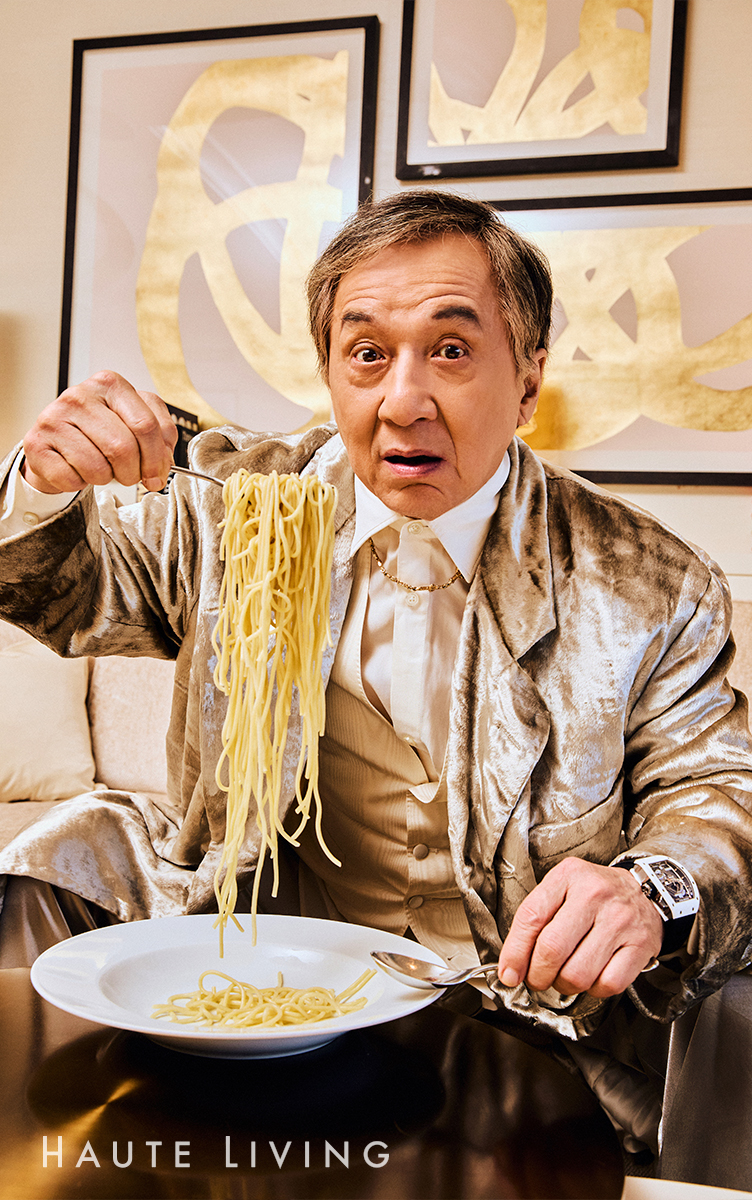
NECKLACE: Emmanuele Biocchi
WATCH: Richard Mille available at Wrist Aficionado
Photo Credit: Juan Veloz
JACKIE CHAN HAS SPENT A LIFETIME redefining action cinema, but his legacy extends far beyond the gravity-defying stunts that made him a global icon. Though he only broke into the American market in the 1990s, he still has a robust body of crossover work between Hollywood and films in his native Hong Kong, including Shanghai Noon (2000) and Shanghai Knights (2003); Shaolin (2011); the aforementioned Karate Kid films; all three Chinese versions of Mulan; The Foreigner (2017); Teenage Mutant Ninja Turtles: Mutant Mayhem (2023); and CZ12 (2012), for which he earned two Guinness World Records (for “Most Stunts Performed by a Living Actor” and “Most Credits in One Movie”). And, in 2016, he became the first Chinese actor to receive an honorary Oscar Lifetime Achievement Award, which recognized his extraordinary achievements in the film industry. In addition to acting, Chan also pursued a career in the music industry, releasing a number of original albums; he also worked as a goodwill ambassador for UNICEF.
Yet, his true passion — one that has grown in parallel with his career — is giving back. At this stage in his life, he sees himself less as an action star and more of a guardian — of both the people and the world itself.
Over the years, he has donated millions to educational programs, disaster relief efforts, and children’s hospitals worldwide. His Jackie Chan Charitable Foundation, founded in 1988, provides scholarships, medical assistance, and aid for those in need, particularly in China. In 2004, he launched Dragon’s Heart Foundation, dedicated to building schools and improving access to education in impoverished rural areas.
“When I was young, I didn’t have much,” he says. “I didn’t go to school. That’s why I always tell young people, ‘Study hard. Learn as much as you can’ — because I wish I had that chance.”
Beyond his humanitarian work, Chan is also deeply committed to wildlife conservation, with a special focus on protecting pandas. His love for the species isn’t just symbolic — he has two real-life adopted pandas in Sichuan, China: Long Long (Dragon) and Feng Feng (Phoenix); the real-life versions of the toy pandas he totes around. Their names are tied to powerful symbols in Chinese culture, representing balance, harmony, and prosperity — qualities he strives to embody in his own life.
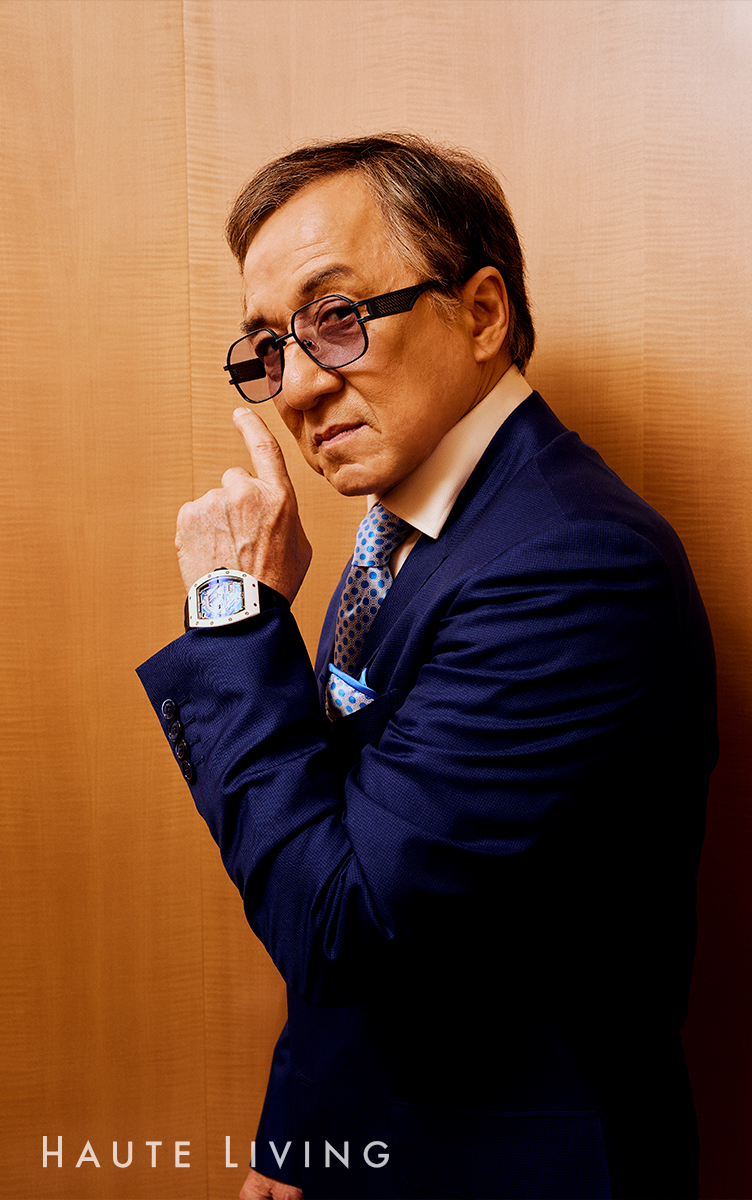
WATCH: Richard Mille available at Wrist Aficionado
Photo Credit: Juan Veloz
“I love pandas, just like everyone else in this world. I mean, who doesn’t love a panda?” he laughs. “They are lazy but wise. They just eat, sleep, and enjoy life. That’s something I think we all need to learn.”
His efforts in panda conservation are part of his larger environmental advocacy. He has worked alongside organizations like WildAid to combat illegal wildlife trade, using his platform to raise awareness about protecting endangered species. His conservation work, much like his films, carries a deeper message: preserving the world for future generations.
“I’ve been so lucky in my life. I’ve seen the whole world. Now, I want to make sure the next generations can see it, too.”
For all his success, Chan is well aware that life is unpredictable. He has had more injuries than he can count, but there is one moment that changed his life forever.
“We could spend three days just talking about my injuries,” he jokes, before sharing a story about the injury that changed both his life, and career. “Forty-something years ago, I started as a stuntman who only made a couple hundred Hong Kong dollars a day, and then suddenly I became the lead actor in a movie, and I got paid millions. I obviously became a wild kid that everybody could think of… I went on partying all night, every day, just kept having fun and spending money.”
Then, everything changed on the set of Armour of God in 1986.
“I was in [then-Yugoslavia], and I got injured so bad. I fell from a tree and hit my head. I had a craniotomy, and I was literally one step away from heaven — or hell, whichever one I was supposed to be sent to,” he says with a laugh, before adding more somberly, “I was forced to rest for almost a year, and God knows how hard that year was for me.”
Yet, that year of forced stillness gave him clarity.
“I scrutinized my life again,” he says. “I felt like, in addition to making movies, I should do something more for the world, rather than wasting my life partying.”
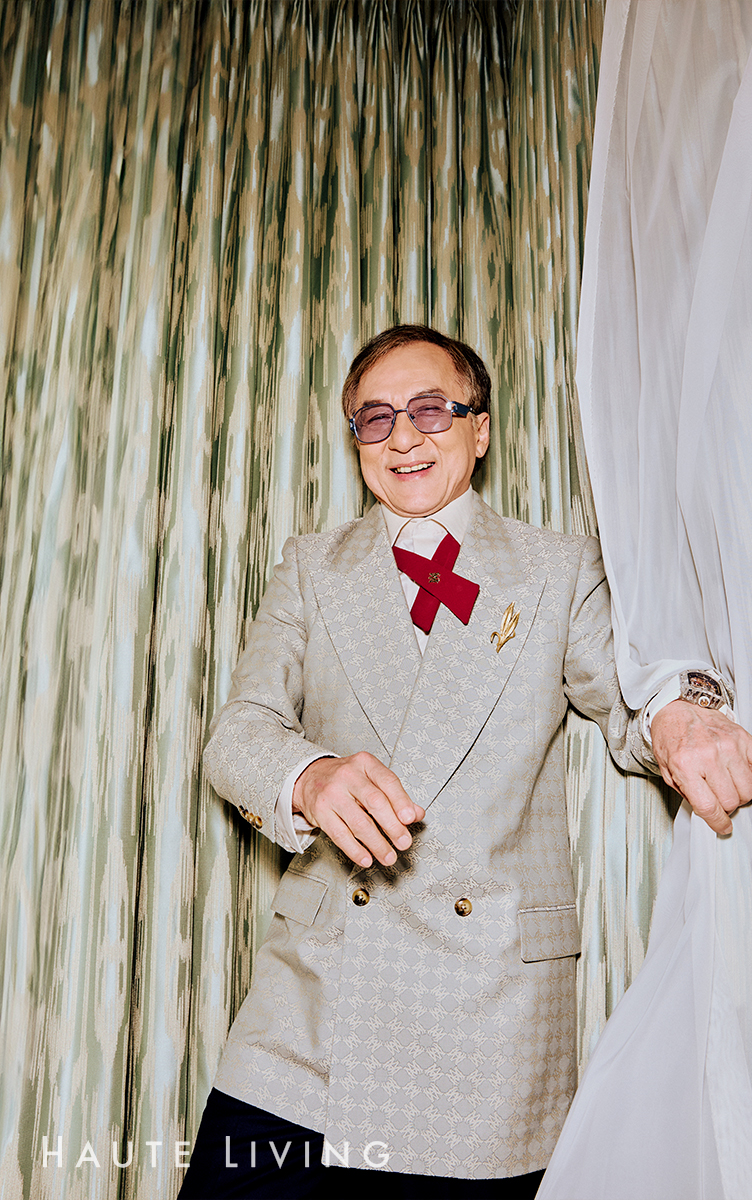
GLASSES: Armação Para Óculos De Grau Unissex Titanium Quadrado LV.MT from Lunettiq Eyewear WATCH: Richard Mille available at Wrist Aficionado
Photo Credit: Juan Veloz
That was when he reached out to his management and started his foundation — which he now sees as one of his greatest legacies. The other, of course, is his career itself.
To this day, in his seventies, Chan’s work ethic remains relentless, but at this stage in both his life and career, his priorities have changed; he is more focused on meaning than ever before. He is ready and always looking for new challenges.
“I want to do something outside of action. I want to be an actor who can handle different roles. I personally am very open to change; I want to do some new stuff, rather than staying in the action world. That’s just not me; I’m always trying to break boundaries,” he admits, adding, “Every filmmaker and actor, they want their own movies to be special and at the same time commercially successful. It’s the same for me as well. Most of the movies I made were commercial films, so it wasn’t that much of a conflict. I would constantly brainstorm how to design an action sequence to make it more appealing to the audience.”
His philosophy — one of always pushing boundaries and never settling — applies not just to his films, but to how he views life itself.
“You can’t make everyone satisfied and happy, so the only thing you can do is be true and honest to yourself,” he says. “Cinema is an art of regret. You always feel like you could do more, do better. But for me, as long as I push myself to the limit, I can move on without regret.”
At this point in time, he’s happy to say that he has none of the above. “Looking back at my career, I did every role, every movie at my best. I would constantly brainstorm how to design action to make it more appealing to the audience, and although [some audience members may not have liked some of my films], that’s OK! As long as I did the best I could and I’m true to myself, that’s enough.” He pauses, making an addendum, sharing that he probably would have taught his younger self a few specific skills. “[I would have told me] learn as much as you can and don’t waste time. I’d probably tell my younger self, ‘Jackie, you should study English harder, and don’t give up on learning that piano!’ I could have used those skill sets to make my movies better.”
One (or all) could argue that Chan is doing pretty darn well — and he would, quite naturally, agree. He is, just as he appears, completely content. “[I’d call this stage of my life] peaceful and perfect,” he admits. “I’m happy about this current stage of my life, to be honest. There’s nothing to complain about. My life has been spectacular.”
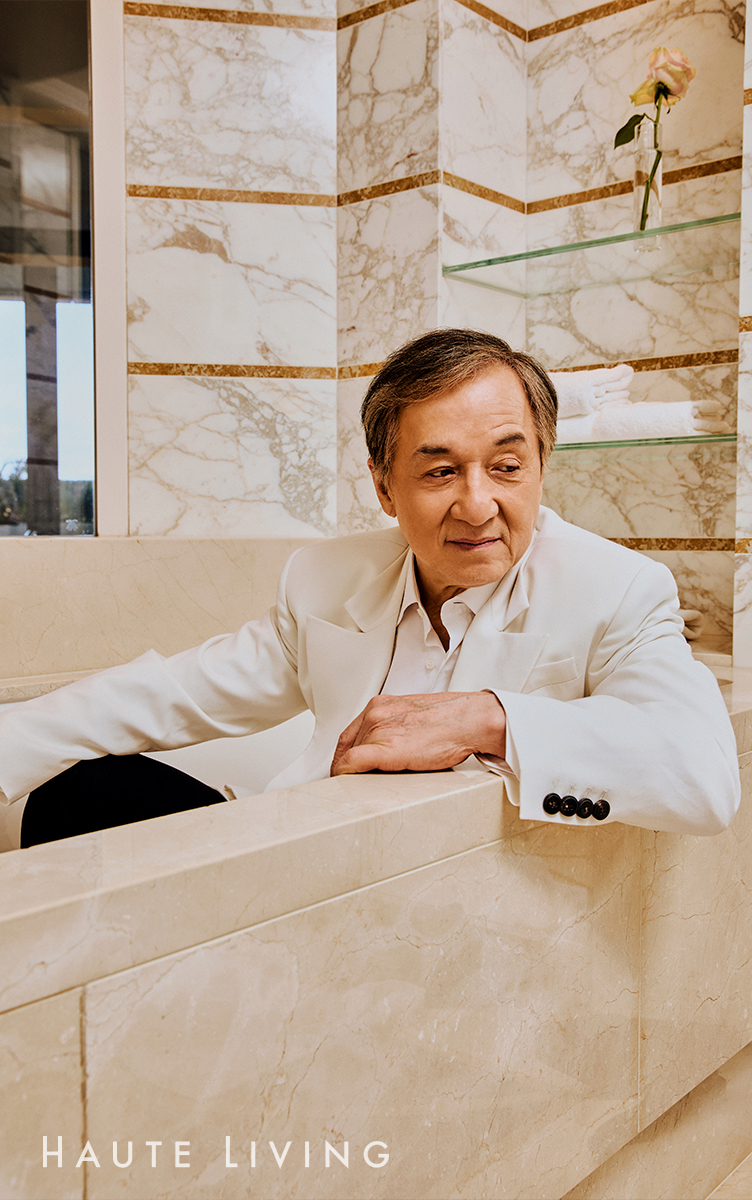
Photo Credit: Juan Veloz
He sleeps extremely well at night knowing that his life will always live on through cinema, thus ensuring that his legacy remains intact. “My movies will last forever, because in them, I never age. I hope people will watch and just learn one thing: be a good person. That’s enough.” He pauses, and says, “I was raised in an ordinary family; I was an ordinary person who didn’t go to school at all. [Which is why the greatest luxury in my life] definitely is the movies. Without films, there’s no way I would have gotten to see the whole world. Cinema has unfolded the world to me and made my life such an incredible experience. I know I’m a lucky person, and I’m forever grateful for it.”
Which is why Jackie Chan keeps going, traveling, working, and chasing something bigger than himself — whether that’s in the form of action, philanthropy, or simply spreading joy.
This is particularly apparent when our shoot wraps, in the way he hugs each and every single crew member goodbye, profusely thanking them, making every person in the room preen and shine under the warmth of his smile. As he prepares to make his exit — he is en route to the 2025 Critics’ Choice Awards, where he will receive a standing ovation — he gathers his things, hands full with a box of his guilty pleasure, croissants. He stops to adjust his backpack, so that his ever-present panda companions can peek out from the top to see the world — his world. They are, in many ways, an extension of his personality — reminders to find joy, embrace playfulness, and never take life too seriously.
“Maybe I’m like them,” he says, laughing. “I don’t feel like I work either. I just keep moving, keep learning, keep playing.”
This is the way to really live life, I think. Where your job is not a job, but an integral fundamental, core part of you. And how could someone give up on themselves? Jackie Chan certainly isn’t about to, that’s for sure.
“Maybe one day I’ll stop,” he muses, as if the thought has just occurred to him. Then he shakes his head, that glint of childlike wonder still shining in his eyes. He has absolutely no intention of stopping, because he knows there is so much more to do — in film, and in life. “But not yet,” he says. “I’m still on the road.” And with that, he shares one last toothy, radiant smile, grabs his toy pandas, gives them a little shake, and heads off to his next adventure.
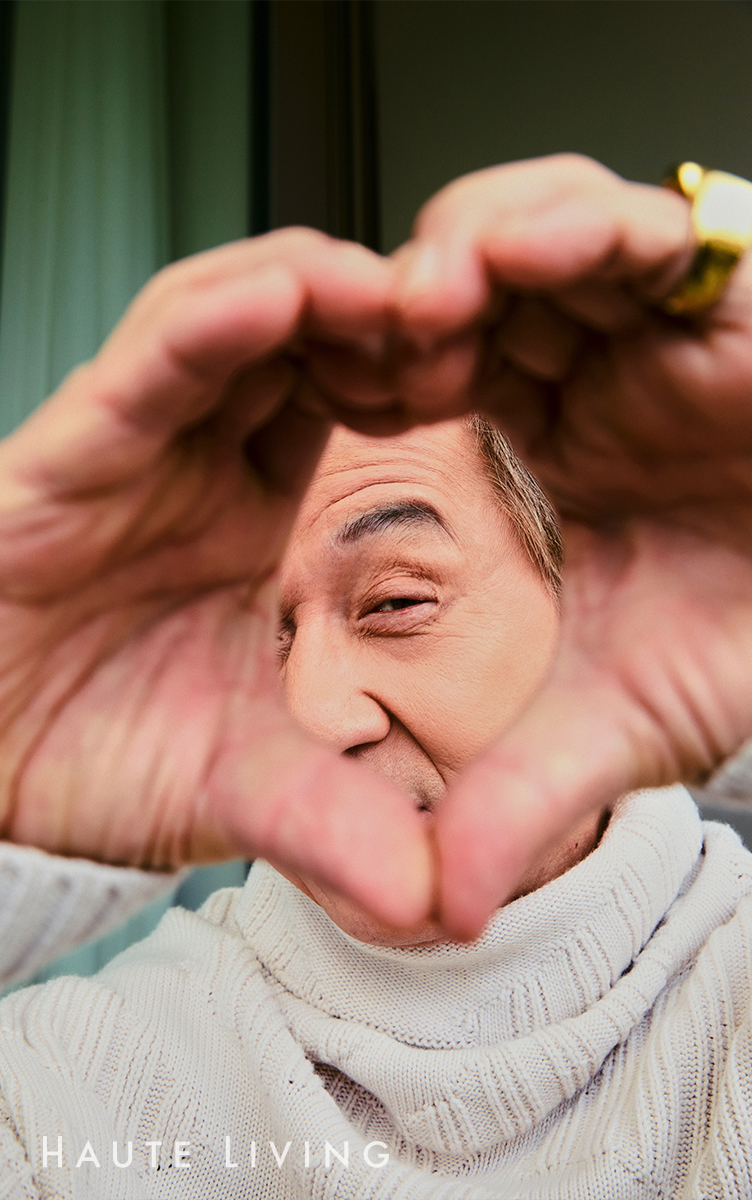
Photo Credit: Juan Veloz
The post Jackie Chan Returns To “Karate Kid” — And He’s Bringing Pandas, Wisdom, And Wild Stories With Him appeared first on Haute Living.
































































